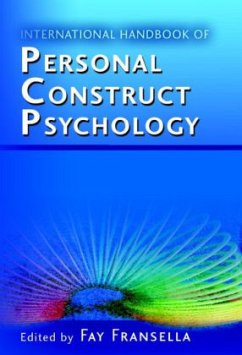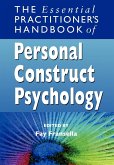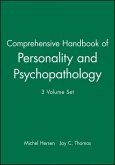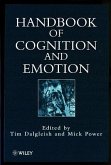- Gebundenes Buch
- Merkliste
- Auf die Merkliste
- Bewerten Bewerten
- Teilen
- Produkt teilen
- Produkterinnerung
- Produkterinnerung
This first "International Handbook of Personal Construct Psychology (PCP) illustrates by its breadth and scope the huge influence the work of George Kelly has had, since its inception in 1955, on psychology and related disciplines. Including some previously unpublished material by Kelly and Bannister, alongside classic texts, the handbook is largely devoted to the practical applications of Kellys work today.Areas in which PCP is now being used include expert systems, forensic psychology, psychotherapy and counselling, politics, post-traumatic stress, education, developmental and family…mehr
Andere Kunden interessierten sich auch für
![The Essential Practitioner's Handbook of Personal Construct Psychology The Essential Practitioner's Handbook of Personal Construct Psychology]() The Essential Practitioner's Handbook of Personal Construct Psychology76,99 €
The Essential Practitioner's Handbook of Personal Construct Psychology76,99 €![Beratung auf der Grundlage der Personal Construct Psychology Beratung auf der Grundlage der Personal Construct Psychology]() Martin FrommBeratung auf der Grundlage der Personal Construct Psychology16,00 €
Martin FrommBeratung auf der Grundlage der Personal Construct Psychology16,00 €![Construct-Worded vs. Mixed-Item Formats Construct-Worded vs. Mixed-Item Formats]() Jennifer JablonskiConstruct-Worded vs. Mixed-Item Formats32,99 €
Jennifer JablonskiConstruct-Worded vs. Mixed-Item Formats32,99 €![The International Handbook of Suicide and Attempted Suicide The International Handbook of Suicide and Attempted Suicide]() K HawtonThe International Handbook of Suicide and Attempted Suicide130,99 €
K HawtonThe International Handbook of Suicide and Attempted Suicide130,99 €![Perfectionist procrastination as a new construct? Perfectionist procrastination as a new construct?]() Lisa KotterPerfectionist procrastination as a new construct?25,99 €
Lisa KotterPerfectionist procrastination as a new construct?25,99 €![Comprehensive Handbook of Personality and Psychopathology, Set Comprehensive Handbook of Personality and Psychopathology, Set]() Michel Hersen / Jay C. Thomas (Hgg.)Comprehensive Handbook of Personality and Psychopathology, Set704,99 €
Michel Hersen / Jay C. Thomas (Hgg.)Comprehensive Handbook of Personality and Psychopathology, Set704,99 €![Handbook of Cognition and Emotion Handbook of Cognition and Emotion]() Tim Dalgleish / Mick Power (Hgg.)Handbook of Cognition and Emotion357,99 €
Tim Dalgleish / Mick Power (Hgg.)Handbook of Cognition and Emotion357,99 €-
-
-
This first "International Handbook of Personal Construct Psychology (PCP) illustrates by its breadth and scope the huge influence the work of George Kelly has had, since its inception in 1955, on psychology and related disciplines. Including some previously unpublished material by Kelly and Bannister, alongside classic texts, the handbook is largely devoted to the practical applications of Kellys work today.Areas in which PCP is now being used include expert systems, forensic psychology, psychotherapy and counselling, politics, post-traumatic stress, education, developmental and family psychology, organizational psychology, cross-cultural understanding, nursing, policing, artificial intelligence and sport. As far as possible, each chapter aims to give the reader an idea or method that they can try out for themselves in their own work or personal context.Even today some of Kellys ideas are novel. Although all-embracing, this handbook cannot be comprehensive as new applications and extensions are being developed continually. It will prove an invaluable reference to practitioners and scholars from a wide range of disciplines, wherever human understanding is relevant.
Produktdetails
- Produktdetails
- Verlag: Wiley & Sons
- Seitenzahl: 496
- Erscheinungstermin: 9. Juli 2003
- Englisch
- Abmessung: 251mm x 170mm x 35mm
- Gewicht: 1160g
- ISBN-13: 9780470847275
- ISBN-10: 0470847271
- Artikelnr.: 11789450
- Herstellerkennzeichnung
- Libri GmbH
- Europaallee 1
- 36244 Bad Hersfeld
- gpsr@libri.de
- Verlag: Wiley & Sons
- Seitenzahl: 496
- Erscheinungstermin: 9. Juli 2003
- Englisch
- Abmessung: 251mm x 170mm x 35mm
- Gewicht: 1160g
- ISBN-13: 9780470847275
- ISBN-10: 0470847271
- Artikelnr.: 11789450
- Herstellerkennzeichnung
- Libri GmbH
- Europaallee 1
- 36244 Bad Hersfeld
- gpsr@libri.de
Fay Fransella is Founder and Director of the Centre for Personal Construct Pyschology, Emeritus Reader in Clinical Psychology, University of London and Visiting Professor in Personal Construct Psychology at the University of Hertfordshire, UK. She has written eleven books, eight of them specifically relating to personal construct psychology and published over one hundred and fifty journal papers and chapters.
About the Editor.
International Advisory Panel.
List of Contributors.
Introduction.
Acknowledgements.
Section I: The Psychology of Personal Constructs and its Philosophy.
Chapter 1. A Brief Introduction to Personal Construct Theory (George A.
Kelly).
Chapter 2. George Alexander Kelly: The Man and his Theory (Fay Fransella
and Robert A. Neimeyer).
Chapter 3. Kelly Versus Clockwork Psychology (Don Bannister).
Chapter 4. Kelly's Philosophy of Constructive Alternativism (Gabriele
Chiari and Maria Laura Nuzzo).
Chapter 5. Research in Personal Construct Psychology (Jack Adams-Webber).
Section II: Beliefs, Feelings and Awareness.
Chapter 6. The Logic of Passion (Don Bannister).
Chapter 7. Belief, Attachment and Awareness (Spencer A. McWilliams).
Chapter 8. Working with Anger (Peter Cummins).
Section III: From Theory to Practice.
Chapter 9. The Repertory Grid Technique (Richard C. Bell).
Chapter 10. Some Skills and Tools for Personal Construct Practitioners
(Fay Fransella).
Chapter 11. Elicitation Methods to Fit Different Purposes (Pam Denicolo).
Chapter 12. Expert Systems (Mildred L.G. Shaw and Brian R. Gaines).
Section IV: Individuals in Relation to Society.
Chapter 13. Social Relations in the Modern World (Devorah
Kalekin-Fishman).
Chapter 14. Cross-Cultural Construing (Jörn W. Scheer).
Chapter 15. Forensic Personal Construct Psychology: Assessing and Treating
Offenders (James Horley).
Chapter 16. Making Sense of Dependency (Beverly M.Walker).
Chapter 17. Personal Construct Theory and Politics and the Politics of
Personal Construct Theory (Don Bannister).
Chapter 18. Moving Personal Construct Psychology to Politics:
Understanding the Voices with which we Disagree (Dusan Stojnov).
Section V: Personal Change and Reconstruction.
Part 1: A Theoretical Understanding.
Chapter 19. Psychological Disorder as Imbalance (David Winter).
Chapter 20. From Theory to Research to Change (Fay Fransella).
Chapter 21. An Approach to Post-Traumatic Stress (Kenneth W. Sewell).
Part 2: The Process of Change.
Chapter 22. Is Treatment a Good Idea? (George A. Kelly).
Chapter 23. An Audacious Adventure: Personal Construct Counselling and
Psychotherapy (Franz R. Epting, Marco Gemignani and Malcolm C. Cross).
Chapter 24. Personal Construct Psychotherapy and the Constructivist
Horizon (Robert A. Neimeyer and Scott A. Baldwin).
Chapter 25. Experiential Personal Construct Psychotherapy (Larry Leitner
and Jill Thomas).
Chapter 26. The Evidence Base for Personal Construct Psychotherapy (David
Winter).
Section VI: Development and Education.
Part 1: Development.
Chapter 27. Children's Development of Personal Constructs (James C.
Mancuso).
Chapter 28. Constructive Intervention when Children are Presented as
Problems (Tom Ravenette).
Part 2: Education.
Chapter 29. Teacher-Student Relations at University Level (George A.
Kelly).
Chapter 30. Construing Teaching and Teacher Education Worldwide (Maureen
Pope).
Chapter 31. A Psychology for Teachers (Phillida Salmon).
Chapter 32. Learning and Diagnosis of Learning Results (Martin Fromm).
Section VII: Understanding Organizations
Chapter 33. The Power of a Good Theory (Sean Brophy, Fay Fransella and
Nick Reed).
Chapter 34. Making Sense of the 'Group Mind' (Adrian Robertson).
Chapter 35. The Struggles of Organizational Transitions (Nelarine
Cornelius).
Chapter 36. How can we Understand One Another if we don't Speak the same
Language? (Devi Jankowicz).
Chapter 37. Clarifying Corporate Values: A Case Study (Sean Brophy).
Section VIII: Philosophical and Religious Influences on the Thinking of
George Kelly.
Chapter 38. The Phenomenological Context of Personal Construct Psychology
(Trevor Butt).
Chapter 39. Pragmatism and Religion: Dewey's Twin Influences? (Bill
Warren).
Section IX: Living with Personal Construct Psychology: Personal Accounts.
Chapter 40. Personal Construct Psychology and Me (Dorothy Rowe).
Chapter 41. A Psychology of Questions (Miller Mair).
Chapter 42. Kelly's Influence on Research and Career (Rue L. Cromwell).
Section X: Reaching Out.
Chapter 43.1 Nursing (Jacqui Costigan, Julie M. Ellis and Julie
Watkinson).
Chapter 43.2 Family Therapy (Harry Procter).
Chapter 43.3 The Metropolitan Police, London: A Personal Account (John
Porter).
Chapter 43.4 A Sporting Use of Personal Construct Psychology (David
Savage).
Chapter 43.5 Artificial Intelligence (Jack Adams-Webber).
Chapter 44. New Avenues to Explore and Questions to Ask (Fay Fransella).
Appendix 1. Theoretical Definitions.
Appendix 2. Some Basic Books on Personal Construct Psychology.
Appendix 3. Computer Programs and Websites.
References.
Index.
International Advisory Panel.
List of Contributors.
Introduction.
Acknowledgements.
Section I: The Psychology of Personal Constructs and its Philosophy.
Chapter 1. A Brief Introduction to Personal Construct Theory (George A.
Kelly).
Chapter 2. George Alexander Kelly: The Man and his Theory (Fay Fransella
and Robert A. Neimeyer).
Chapter 3. Kelly Versus Clockwork Psychology (Don Bannister).
Chapter 4. Kelly's Philosophy of Constructive Alternativism (Gabriele
Chiari and Maria Laura Nuzzo).
Chapter 5. Research in Personal Construct Psychology (Jack Adams-Webber).
Section II: Beliefs, Feelings and Awareness.
Chapter 6. The Logic of Passion (Don Bannister).
Chapter 7. Belief, Attachment and Awareness (Spencer A. McWilliams).
Chapter 8. Working with Anger (Peter Cummins).
Section III: From Theory to Practice.
Chapter 9. The Repertory Grid Technique (Richard C. Bell).
Chapter 10. Some Skills and Tools for Personal Construct Practitioners
(Fay Fransella).
Chapter 11. Elicitation Methods to Fit Different Purposes (Pam Denicolo).
Chapter 12. Expert Systems (Mildred L.G. Shaw and Brian R. Gaines).
Section IV: Individuals in Relation to Society.
Chapter 13. Social Relations in the Modern World (Devorah
Kalekin-Fishman).
Chapter 14. Cross-Cultural Construing (Jörn W. Scheer).
Chapter 15. Forensic Personal Construct Psychology: Assessing and Treating
Offenders (James Horley).
Chapter 16. Making Sense of Dependency (Beverly M.Walker).
Chapter 17. Personal Construct Theory and Politics and the Politics of
Personal Construct Theory (Don Bannister).
Chapter 18. Moving Personal Construct Psychology to Politics:
Understanding the Voices with which we Disagree (Dusan Stojnov).
Section V: Personal Change and Reconstruction.
Part 1: A Theoretical Understanding.
Chapter 19. Psychological Disorder as Imbalance (David Winter).
Chapter 20. From Theory to Research to Change (Fay Fransella).
Chapter 21. An Approach to Post-Traumatic Stress (Kenneth W. Sewell).
Part 2: The Process of Change.
Chapter 22. Is Treatment a Good Idea? (George A. Kelly).
Chapter 23. An Audacious Adventure: Personal Construct Counselling and
Psychotherapy (Franz R. Epting, Marco Gemignani and Malcolm C. Cross).
Chapter 24. Personal Construct Psychotherapy and the Constructivist
Horizon (Robert A. Neimeyer and Scott A. Baldwin).
Chapter 25. Experiential Personal Construct Psychotherapy (Larry Leitner
and Jill Thomas).
Chapter 26. The Evidence Base for Personal Construct Psychotherapy (David
Winter).
Section VI: Development and Education.
Part 1: Development.
Chapter 27. Children's Development of Personal Constructs (James C.
Mancuso).
Chapter 28. Constructive Intervention when Children are Presented as
Problems (Tom Ravenette).
Part 2: Education.
Chapter 29. Teacher-Student Relations at University Level (George A.
Kelly).
Chapter 30. Construing Teaching and Teacher Education Worldwide (Maureen
Pope).
Chapter 31. A Psychology for Teachers (Phillida Salmon).
Chapter 32. Learning and Diagnosis of Learning Results (Martin Fromm).
Section VII: Understanding Organizations
Chapter 33. The Power of a Good Theory (Sean Brophy, Fay Fransella and
Nick Reed).
Chapter 34. Making Sense of the 'Group Mind' (Adrian Robertson).
Chapter 35. The Struggles of Organizational Transitions (Nelarine
Cornelius).
Chapter 36. How can we Understand One Another if we don't Speak the same
Language? (Devi Jankowicz).
Chapter 37. Clarifying Corporate Values: A Case Study (Sean Brophy).
Section VIII: Philosophical and Religious Influences on the Thinking of
George Kelly.
Chapter 38. The Phenomenological Context of Personal Construct Psychology
(Trevor Butt).
Chapter 39. Pragmatism and Religion: Dewey's Twin Influences? (Bill
Warren).
Section IX: Living with Personal Construct Psychology: Personal Accounts.
Chapter 40. Personal Construct Psychology and Me (Dorothy Rowe).
Chapter 41. A Psychology of Questions (Miller Mair).
Chapter 42. Kelly's Influence on Research and Career (Rue L. Cromwell).
Section X: Reaching Out.
Chapter 43.1 Nursing (Jacqui Costigan, Julie M. Ellis and Julie
Watkinson).
Chapter 43.2 Family Therapy (Harry Procter).
Chapter 43.3 The Metropolitan Police, London: A Personal Account (John
Porter).
Chapter 43.4 A Sporting Use of Personal Construct Psychology (David
Savage).
Chapter 43.5 Artificial Intelligence (Jack Adams-Webber).
Chapter 44. New Avenues to Explore and Questions to Ask (Fay Fransella).
Appendix 1. Theoretical Definitions.
Appendix 2. Some Basic Books on Personal Construct Psychology.
Appendix 3. Computer Programs and Websites.
References.
Index.
About the Editor.
International Advisory Panel.
List of Contributors.
Introduction.
Acknowledgements.
Section I: The Psychology of Personal Constructs and its Philosophy.
Chapter 1. A Brief Introduction to Personal Construct Theory (George A.
Kelly).
Chapter 2. George Alexander Kelly: The Man and his Theory (Fay Fransella
and Robert A. Neimeyer).
Chapter 3. Kelly Versus Clockwork Psychology (Don Bannister).
Chapter 4. Kelly's Philosophy of Constructive Alternativism (Gabriele
Chiari and Maria Laura Nuzzo).
Chapter 5. Research in Personal Construct Psychology (Jack Adams-Webber).
Section II: Beliefs, Feelings and Awareness.
Chapter 6. The Logic of Passion (Don Bannister).
Chapter 7. Belief, Attachment and Awareness (Spencer A. McWilliams).
Chapter 8. Working with Anger (Peter Cummins).
Section III: From Theory to Practice.
Chapter 9. The Repertory Grid Technique (Richard C. Bell).
Chapter 10. Some Skills and Tools for Personal Construct Practitioners
(Fay Fransella).
Chapter 11. Elicitation Methods to Fit Different Purposes (Pam Denicolo).
Chapter 12. Expert Systems (Mildred L.G. Shaw and Brian R. Gaines).
Section IV: Individuals in Relation to Society.
Chapter 13. Social Relations in the Modern World (Devorah
Kalekin-Fishman).
Chapter 14. Cross-Cultural Construing (Jörn W. Scheer).
Chapter 15. Forensic Personal Construct Psychology: Assessing and Treating
Offenders (James Horley).
Chapter 16. Making Sense of Dependency (Beverly M.Walker).
Chapter 17. Personal Construct Theory and Politics and the Politics of
Personal Construct Theory (Don Bannister).
Chapter 18. Moving Personal Construct Psychology to Politics:
Understanding the Voices with which we Disagree (Dusan Stojnov).
Section V: Personal Change and Reconstruction.
Part 1: A Theoretical Understanding.
Chapter 19. Psychological Disorder as Imbalance (David Winter).
Chapter 20. From Theory to Research to Change (Fay Fransella).
Chapter 21. An Approach to Post-Traumatic Stress (Kenneth W. Sewell).
Part 2: The Process of Change.
Chapter 22. Is Treatment a Good Idea? (George A. Kelly).
Chapter 23. An Audacious Adventure: Personal Construct Counselling and
Psychotherapy (Franz R. Epting, Marco Gemignani and Malcolm C. Cross).
Chapter 24. Personal Construct Psychotherapy and the Constructivist
Horizon (Robert A. Neimeyer and Scott A. Baldwin).
Chapter 25. Experiential Personal Construct Psychotherapy (Larry Leitner
and Jill Thomas).
Chapter 26. The Evidence Base for Personal Construct Psychotherapy (David
Winter).
Section VI: Development and Education.
Part 1: Development.
Chapter 27. Children's Development of Personal Constructs (James C.
Mancuso).
Chapter 28. Constructive Intervention when Children are Presented as
Problems (Tom Ravenette).
Part 2: Education.
Chapter 29. Teacher-Student Relations at University Level (George A.
Kelly).
Chapter 30. Construing Teaching and Teacher Education Worldwide (Maureen
Pope).
Chapter 31. A Psychology for Teachers (Phillida Salmon).
Chapter 32. Learning and Diagnosis of Learning Results (Martin Fromm).
Section VII: Understanding Organizations
Chapter 33. The Power of a Good Theory (Sean Brophy, Fay Fransella and
Nick Reed).
Chapter 34. Making Sense of the 'Group Mind' (Adrian Robertson).
Chapter 35. The Struggles of Organizational Transitions (Nelarine
Cornelius).
Chapter 36. How can we Understand One Another if we don't Speak the same
Language? (Devi Jankowicz).
Chapter 37. Clarifying Corporate Values: A Case Study (Sean Brophy).
Section VIII: Philosophical and Religious Influences on the Thinking of
George Kelly.
Chapter 38. The Phenomenological Context of Personal Construct Psychology
(Trevor Butt).
Chapter 39. Pragmatism and Religion: Dewey's Twin Influences? (Bill
Warren).
Section IX: Living with Personal Construct Psychology: Personal Accounts.
Chapter 40. Personal Construct Psychology and Me (Dorothy Rowe).
Chapter 41. A Psychology of Questions (Miller Mair).
Chapter 42. Kelly's Influence on Research and Career (Rue L. Cromwell).
Section X: Reaching Out.
Chapter 43.1 Nursing (Jacqui Costigan, Julie M. Ellis and Julie
Watkinson).
Chapter 43.2 Family Therapy (Harry Procter).
Chapter 43.3 The Metropolitan Police, London: A Personal Account (John
Porter).
Chapter 43.4 A Sporting Use of Personal Construct Psychology (David
Savage).
Chapter 43.5 Artificial Intelligence (Jack Adams-Webber).
Chapter 44. New Avenues to Explore and Questions to Ask (Fay Fransella).
Appendix 1. Theoretical Definitions.
Appendix 2. Some Basic Books on Personal Construct Psychology.
Appendix 3. Computer Programs and Websites.
References.
Index.
International Advisory Panel.
List of Contributors.
Introduction.
Acknowledgements.
Section I: The Psychology of Personal Constructs and its Philosophy.
Chapter 1. A Brief Introduction to Personal Construct Theory (George A.
Kelly).
Chapter 2. George Alexander Kelly: The Man and his Theory (Fay Fransella
and Robert A. Neimeyer).
Chapter 3. Kelly Versus Clockwork Psychology (Don Bannister).
Chapter 4. Kelly's Philosophy of Constructive Alternativism (Gabriele
Chiari and Maria Laura Nuzzo).
Chapter 5. Research in Personal Construct Psychology (Jack Adams-Webber).
Section II: Beliefs, Feelings and Awareness.
Chapter 6. The Logic of Passion (Don Bannister).
Chapter 7. Belief, Attachment and Awareness (Spencer A. McWilliams).
Chapter 8. Working with Anger (Peter Cummins).
Section III: From Theory to Practice.
Chapter 9. The Repertory Grid Technique (Richard C. Bell).
Chapter 10. Some Skills and Tools for Personal Construct Practitioners
(Fay Fransella).
Chapter 11. Elicitation Methods to Fit Different Purposes (Pam Denicolo).
Chapter 12. Expert Systems (Mildred L.G. Shaw and Brian R. Gaines).
Section IV: Individuals in Relation to Society.
Chapter 13. Social Relations in the Modern World (Devorah
Kalekin-Fishman).
Chapter 14. Cross-Cultural Construing (Jörn W. Scheer).
Chapter 15. Forensic Personal Construct Psychology: Assessing and Treating
Offenders (James Horley).
Chapter 16. Making Sense of Dependency (Beverly M.Walker).
Chapter 17. Personal Construct Theory and Politics and the Politics of
Personal Construct Theory (Don Bannister).
Chapter 18. Moving Personal Construct Psychology to Politics:
Understanding the Voices with which we Disagree (Dusan Stojnov).
Section V: Personal Change and Reconstruction.
Part 1: A Theoretical Understanding.
Chapter 19. Psychological Disorder as Imbalance (David Winter).
Chapter 20. From Theory to Research to Change (Fay Fransella).
Chapter 21. An Approach to Post-Traumatic Stress (Kenneth W. Sewell).
Part 2: The Process of Change.
Chapter 22. Is Treatment a Good Idea? (George A. Kelly).
Chapter 23. An Audacious Adventure: Personal Construct Counselling and
Psychotherapy (Franz R. Epting, Marco Gemignani and Malcolm C. Cross).
Chapter 24. Personal Construct Psychotherapy and the Constructivist
Horizon (Robert A. Neimeyer and Scott A. Baldwin).
Chapter 25. Experiential Personal Construct Psychotherapy (Larry Leitner
and Jill Thomas).
Chapter 26. The Evidence Base for Personal Construct Psychotherapy (David
Winter).
Section VI: Development and Education.
Part 1: Development.
Chapter 27. Children's Development of Personal Constructs (James C.
Mancuso).
Chapter 28. Constructive Intervention when Children are Presented as
Problems (Tom Ravenette).
Part 2: Education.
Chapter 29. Teacher-Student Relations at University Level (George A.
Kelly).
Chapter 30. Construing Teaching and Teacher Education Worldwide (Maureen
Pope).
Chapter 31. A Psychology for Teachers (Phillida Salmon).
Chapter 32. Learning and Diagnosis of Learning Results (Martin Fromm).
Section VII: Understanding Organizations
Chapter 33. The Power of a Good Theory (Sean Brophy, Fay Fransella and
Nick Reed).
Chapter 34. Making Sense of the 'Group Mind' (Adrian Robertson).
Chapter 35. The Struggles of Organizational Transitions (Nelarine
Cornelius).
Chapter 36. How can we Understand One Another if we don't Speak the same
Language? (Devi Jankowicz).
Chapter 37. Clarifying Corporate Values: A Case Study (Sean Brophy).
Section VIII: Philosophical and Religious Influences on the Thinking of
George Kelly.
Chapter 38. The Phenomenological Context of Personal Construct Psychology
(Trevor Butt).
Chapter 39. Pragmatism and Religion: Dewey's Twin Influences? (Bill
Warren).
Section IX: Living with Personal Construct Psychology: Personal Accounts.
Chapter 40. Personal Construct Psychology and Me (Dorothy Rowe).
Chapter 41. A Psychology of Questions (Miller Mair).
Chapter 42. Kelly's Influence on Research and Career (Rue L. Cromwell).
Section X: Reaching Out.
Chapter 43.1 Nursing (Jacqui Costigan, Julie M. Ellis and Julie
Watkinson).
Chapter 43.2 Family Therapy (Harry Procter).
Chapter 43.3 The Metropolitan Police, London: A Personal Account (John
Porter).
Chapter 43.4 A Sporting Use of Personal Construct Psychology (David
Savage).
Chapter 43.5 Artificial Intelligence (Jack Adams-Webber).
Chapter 44. New Avenues to Explore and Questions to Ask (Fay Fransella).
Appendix 1. Theoretical Definitions.
Appendix 2. Some Basic Books on Personal Construct Psychology.
Appendix 3. Computer Programs and Websites.
References.
Index.








